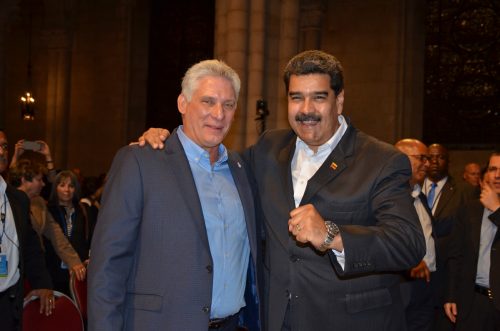Venezuela is trying hard to help its beleaguered Latin neighbor, Cuba, by transporting large amounts of fuel on board oil tankers on the US blacklist, which could expose it to potential legal problems.
Maritime documents showed that the state oil company, Petroleos de Venezuela, had transported Venezuelan crude and some fuel derivatives to Cuba on board a ship included in the US blacklist, according to Reuters.
Venezuela’s forced use of oil tankers on the US blacklist comes as part of attempts to save the Cuban government – its old political ally – as it suffers from a worsening crisis in frequent power outages across the country, according to the specialized energy platform.
Power outages in Cuba
The power outage crisis has caused an increase in popular discontent against the Cuban government loyal to Venezuelan President Nicolás Maduro, both of which Washington wants to get rid of and replace with friendly or less hostile ones.
Venezuela is trying to help its 11 million-strong neighbor by transporting large shipments of Venezuelan fuel in various ways, including using an oil tanker listed on Washington’s blacklist, which could expose the national oil company, Petroleos de Venezuela, to falling under US sanctions again.
Various factors contributed to the exacerbation of the problem of power outages in Cuba, including the increased use of air conditioners by the population, especially in the summer, when temperatures rise significantly.
Fire at the largest station
Cuba’s oil sector has been complaining about major challenges in processing heavy Cuban crude, along with severe fuel shortages, according to the specialist energy platform.
A major fire broke out at the largest Cuban oil station in the city of Matanzas during the month of August 2022, which led to the destruction of large parts of it and weakened its ability to unload and store fuel imports coming from its Venezuelan neighbor.
Cuba relies heavily on imports of Venezuelan crude oil and fuel, but Venezuela’s use of oil tankers on the US blacklist may expose it to potential legal problems with the US administration, which deals with Venezuelan President Nicolas Maduro as an adversary that has been hoping to get rid of him for years.
Nolan tanker banned
Naval documents showed that the oil tanker – named “Nolan” – transported 400,000 barrels of fuel oil from the Jose terminal in Venezuela to Cuba this week.
It will also load 1.13 million barrels of heavy Venezuelan oil later, bringing its total to Cuba closer to 1.53 million barrels, according to internal shipping documents for Venezuelan oil company Petroleos de Venezuela.
The ship is scheduled to sail later in March 2023, without specifying specific days for take-off, according to the specialized energy platform.
The use of oil tankers in the black list

Flying the flag of Panama, the supertanker is a vessel owned by Nigeria-based Tomaros Global Ventures, but has been on the US Treasury’s blacklist since November 2022.
The US Treasury Department accuses this tanker of participating in an international oil smuggling network, and facilitating the trade of crude for Hezbollah and the Iranian Quds Force, according to what was monitored by the specialized energy platform.
The national oil company, Petroleos de Venezuela, the Cuban Ministry of Oil, the Cuban Center for International Press, or the company that owns the ship did not respond to requests for comment so far, according to Reuters.
Difficulty tracking the ship
The suspicious tanker has not issued any indication of moving in any sea direction since its presence in Venezuela in mid-December 2022, which makes it difficult to track the ship, according to data from the Refinitiv company, which specializes in tracking the movement of ships and tankers.
Documents revealed by Reuters indicate that the banned “Nolan” tanker will head to the port of “Matanzas”, where Cuban state companies unload the shipments via smaller vessels that deliver to each other.
It is noteworthy that Venezuela has been exposed to similar crises in fuel shortages and power outages since last year, which prompted it to reduce its exports to Cuba by 6% to 536 thousand barrels per day, according to what was monitored by the specialized energy platform.
related topics..
Also read..

Leave a Reply